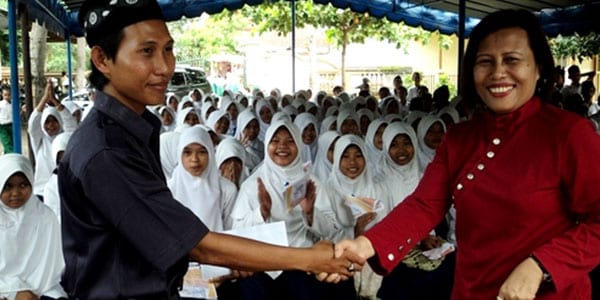An Oxfam partner organisation called APIK is changing the lives of thousands of women and children in Indonesia.

One organisation Oxfam works with is having a very real, very direct impact on women’s lives, everyday.
The Association of Indonesian Women for Justice (APIK) is a legal institute that has been supporting women’s fight against injustice since 1991. APIK work to achieve fairer treatment of women by the legal system and wider society, stop domestic violence, resolve trafficking cases, protect migrant workers and uphold and defend the human rights of women.
Who is APIK?
APIK work throughout West Nusa Tenggara (NTB) province in Lombok. They partnered with Oxfam in 2002 when they operated from a garage with only 3 staff. In this time it has developed from a small provincial NGO to become the pre-eminent women’s rights NGO in NTB and leading organisation providing support for all other gender justice organisations in Indonesia.
Last year Oxfam’s support enabled APIK to train 45 paralegal workers and and they handled 351 cases – cases that are protecting victims of domestic violence and human trafficking and standing up for migrant workers’ and children’s rights. A recent case demonstrates how they were able to help two young women. Names have been changed to protect identities.
HS and NN
 HS and NN are two 17 year old girls from West Java. Poverty pushes many women to try their luck in bigger cities where there are more chances of finding work. Both girls were recruited by a woman called Hosi to work in a restaurant with the promise of a monthly salary of NZ$4-500. They went with Hosi to Lombok and were taken directly to a café in the tourist area of Senggigi.
HS and NN are two 17 year old girls from West Java. Poverty pushes many women to try their luck in bigger cities where there are more chances of finding work. Both girls were recruited by a woman called Hosi to work in a restaurant with the promise of a monthly salary of NZ$4-500. They went with Hosi to Lombok and were taken directly to a café in the tourist area of Senggigi.
What they experienced next was far removed from what was promised them.
They were forced into short and revealing clothing and faced a barrage of constant verbal and physical sexual harassment from drunken customers. Both girls were raped. They were filled with anger, fear and disappointment. They lost hope. HS summed up their situation: “Nasi sudah jadi bubur”, which means ‘the rice has turned to porridge’, an old proverb meaning a condition cannot be changed.
Hosi told them to accept their conditions. But the girls saw their opportunity to escape and used a visit to a beauty parlour as an excuse. They ran for it but were chased by the café customers so hid in a nearby hotel. A security guard helped them make the last stretch to the police station where they filed a report.
APIK step in
The girls were placed into temporary accommodation and the head detective contacted APIK to assist their investigation. APIK searched the café where the girls had been exploited to gather evidence for prosecuting the café owners. They were able to send the two girls back to the safety of their families, but the girls were still threatened over the phone by their abusers. APIK fought to have them protected by the national Institute of Witness and Victim Protection body.
APIK used the media to highlight the girls’ plight and sent a joint letter written with the Office of Women and Child Empowerment to provincial police and national police HQ, pressuring them to finish the police investigation and report into the case. Once the police finished their report, Hosi and another of the perpetrators were arrested and charged with human trafficking.
Your support
Beauty Erawati is the Director of APIK and a leading human rights lawyer. Successes like these give Beauty and her team the drive they need to continue with their difficult work. But a lack of funds is a big problem for APIK – it means they find it difficult to enforce the local laws and regulations that protect women.
Oxfam is currently the only organisation that funds APIK’s legal training scheme, which to operate at the current level requires a minimum of $85k per year.
Beauty thanked Oxfam’s supporters “from the bottom of my heart because your support means hundreds of women across Indonesia have received justice, protection and the right to live their lives as they choose.”
Support APIK’s work with a Protect Women Pack
- Visit APIK’s website or follow them on Twitter (Bahasa Indonesia)



